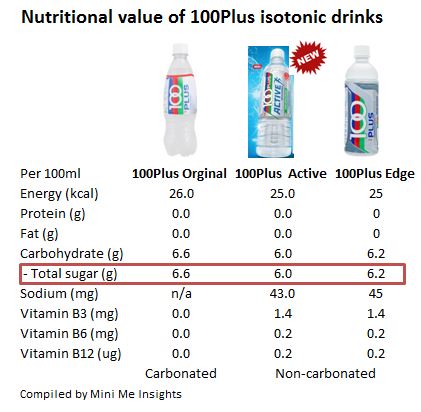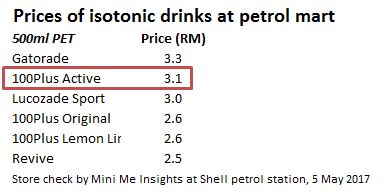
Being one of the most accepted brands of isotonic drink among Malaysians, 100 PLUS is both a refreshing leisure beverage and a re-energizing drink for all ages and mostly for all occasions. With just the acceptable amount of sugar and carbohydrates, 100 PLUS caters for those who just want to rehydrate themselves after some light exercises or during a lunch break from long hours on the computer in the office. This drink also works as an alternative remedy for those who are having a slight fever or those who are down from a cold.
100PLUS ACTIVE
With B Vitamins (B3, B6 & B12), Non-Carbonated 100PLUS ACTIVE is specially designed to facilitate energy production, as well as to aid in after-sports recovery. Plus, it only has 6g out of 100ml of total sugar, lower than 6.6g of total sugar found in the 100Plus Original.

F&N always has a non-carbonated version called 100Plus Edge that claims to provide the “extra energy you need to achieve peak performance in your daily sporting activities.” The 100Plus Edge was first introduced in November 2012.

The main difference between 100Plus Active and 100Plus Edge is in the total sugar. The new product only has 6.0g of total sugar compared with 6.2 for 100Plus Edge. The lower total sugar enables 100Plus Active to be entitled to the new Healthier Choice Logo issued by the Ministry of Health.

Moreover, to help Malaysians consume less sugar, 100PLUS released the NEW 100PLUS Reduced Sugar in 2018.

This way, you can continue to refresh and rehydrate with the popular isotonic drink after your daily activities. The formula allows for efficient absorption of fluids into the body, replenishing it 40% faster than water, making the drink become the preferred choice for people.
This comment has been removed by the author.
ReplyDeletei would like to try out the reduced sugar 100 plus
ReplyDeleteSeems like 100 plus active more healthy.
ReplyDeleteI prefer to drink 100 plus because of the reduced sugar content.
ReplyDeleteI prefer the 100 Plus with less sugar.
ReplyDeleteSeems like 100 plus active more energetic.
ReplyDeleteBut I prefer king kongin energy drinks with zero sugar energy drinks
Energy drinks boost alertness and energy with caffeine, vitamins, and amino acids. They enhance focus and endurance but should be consumed in moderation. For balanced hydration, pairing them with the best moisturizing creams for dry skin helps maintain skin health.
ReplyDelete